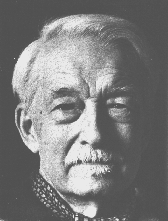As I mentioned a few weeks ago in this space, 1951 saw the publication of some rather significant books, including Hannah Arendt's The Origins of Totalitarianism and H. Richard Niebuhr's Christ and Culture. Another book released the same year is Jacques Maritain's Man and the State originally published by the University of Chicago Press. More than any other single person in the 20th century, Maritain (1882-1973) was associated with the neo-Thomist revival launched at the end of the 19th century by Pope Leo XIII. Although he was brought up in a nominally protestant home in his native France, he converted to Roman Catholicism in 1906, along with his wife Raïssa. In 1910 he began reading the works of Thomas Aquinas, and these would have a profound influence on his subsequent thinking.

Maritain authored many books and articles on a wide variety of subjects, but he is best known for those touching on politics and society. Man and the State is especially important insofar as we see in its pages the broad contours of his political thought in its mature form, after his earlier flirtation with and subsequent opposition to European fascism.
In this book Maritain is careful to distinguish among the concepts of nation, body politic or political society, and state. The state, as he sees it, is superior to other parts of the body politic, but it is inferior to the whole body politic itself. Where the state comes to see itself as identical with the whole body politic, then we find the seeds of abuse of power and even totalitarianism.
The State is only that part of the body politic especially concerned with the maintenance of law, the promotion of the common welfare and public order, and the administration of public affairs. The State is a part which specializes in the interests of the whole (p. 12).
Maritain is similarly opposed to the ascription of sovereignty, with its connotations of absolute power and final authority, to the state, or indeed to any merely human institution.
One can, of course, easily disagree with his definitions (as do I), but they ought to be understood within the context of the Catholic principle of subsidiarity, which presupposes a hierarchical order of society. Subsidiarity is a means of limiting the state so that it does not overwhelm the array of nonstate communities necessary for a healthy society. Writes Maritain:
But the body politic also contains in its superior unity the family units, whose essential rights and freedoms are anterior to itself, and a multiplicity of other particular societies which proceed from the free initiative of citizens and should be as autonomous as possible.
Thus Maritain's thought, like Arendt's, can be seen as another contribution to the intellectual struggle against totalitarianism in the middle of the past century.

No comments:
Post a Comment